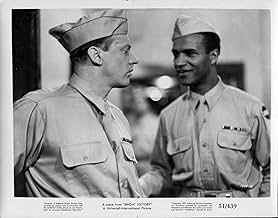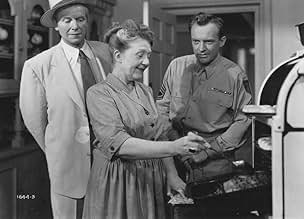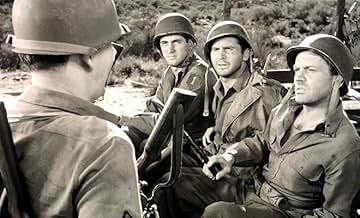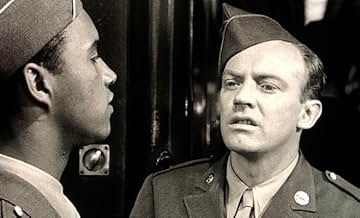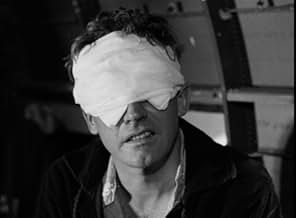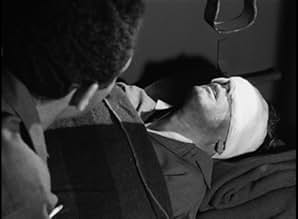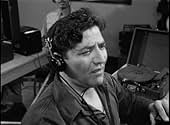IMDb रेटिंग
7.3/10
1.1 हज़ार
आपकी रेटिंग
अपनी भाषा में प्लॉट जोड़ेंAfter he gets blinded by a German sniper's bullet in 1943, Sergeant Larry Nevins begins the long and painful road to recovery.After he gets blinded by a German sniper's bullet in 1943, Sergeant Larry Nevins begins the long and painful road to recovery.After he gets blinded by a German sniper's bullet in 1943, Sergeant Larry Nevins begins the long and painful road to recovery.
- 2 ऑस्कर के लिए नामांकित
- 5 जीत और कुल 6 नामांकन
Julie Adams
- Chris Paterson
- (as Julia Adams)
फ़ीचर्ड समीक्षाएं
10g2608671
I first saw this movie as a kid in the early 60's at my dad's suggestion. He wanted me to pay attention to the real story, that being that racism has no place in a free society. I did pay attention, and to this day, his instance that I watch the movie for content is among the fondest memories I have of my Dad. He taught me how to hunt, fish, drive a car, paint a house and respect people. It is all the more remarkable, especially since I grew up in an all white town in western PA. Also, I now live no more than a few hundred yards where the movie was made. The former VF Army Hospital is now mostly under the ownership of the VF Christian College - a great resource and an asset to our community. When my family moved here some 20 years ago, we immediately discovered the "old army base" and I frequently took our kids there to walk, play on the falling down miniature golf course and just try to imagine what the facility was like when it was in use (swimming pool, gymnasium, small duck pin bowing alley, full size golf course and two fishing ponds)-- and what the presence of the base meant to Phoenixville then. I actually played handball on that court that Artuhr Kennedy is tested on for obstacle perception. The facility specialized in head and eye injuries and had a very substantial psychiatric ward as well. Anyhow, along with the anti-racism message umbered in the movie, I enjoy the scenes of the old hospital and reflect on what it looks like now. And of course,-- the scenes of old Phoenixville, although way before my time, bring a sense of nostalgia to me that is hard to describe not being a native of the area. None the less, it's there. As an aside, for anyone who is interested; Phoenixville is where they filmed The Blob with Steve McQueen -- the Colonial theater still stands to this day and has become a landmark. Oddly enough, McQueen and Kennedy would appear together in Nevada Smith years later. It is indeed a small world.
I stumbled upon this excellent and compelling film during AMC's "Veterans' Day Movie Marathon." Dealing with a soldier's (Arthur Kennedy) rehabilitation after losing his sight during WWII in surprisingly frank ways for its time (released in 1951), this seems to me to be the first time I saw raw racism and its consequences in a film. A superb love story on the surface, it's the underlying themes of classism, racism and realistically dealing with the handicapped which set it a notch above the terrific 1946 film, "The Best Years of our Lives." Face it, Harold Russell, while a hero, was no actor. The electricity between Kennedy and his new "friend" (played by Peggy Dow ~ whatever became of this talented actress? Her career lasted only 4 years) is remarkable. Happy ending doesn't detract.
Of course I always loved Bright Victory, since my dad was one of the blinded veterans used as extras in the movie. I remember him telling me that Kennedy had dark contacts in, and would yell out to remove them as soon as a scene was over.My dad said he felt like calling out, "But I can't remove mine!" It is a wonderful story of many blinded vets, particularly at that time. A captain was accompanying my dad and another blind soldier, who happened to be black, to their homes in GA. When they came to the train station in DC, they were informed that the black man could no longer ride in the same car. Both the captain and my dad were outraged for this soldier who had also gave his sight for his country. A new car was added to the train, and the 3 soldiers had it all to themselves. I was proud of my dad and the captain for taking that stand. They are deceased, but the lesson of the train, and the lesson of "Bright Victory" are both stories I pass on to my child and to my students over 32 years.
"Bright Victory" came as a total surprise. The film is not seen as much as it should, because of its positive message. Mark Robson directed with an eye to detail. "Bright Victory" was adapted by Robert Bruckner and has a pleasant music score by Frank Skinner.
In spite of taking place during WWII, the movie seems timeless right now because of the Iraqi conflict. We are shown an Army hospital where the young soldiers are seen rehabilitating and learning new skills for their permanent disabilities. The wounded men we see in the Army facility at Valley Forge, Pa., are being treated because of their blindness as a result of wounds received in combat.
For a 1951 film, "Bright Victory", was light years ahead since the young G.I.s we see in the hospital have to come to terms with the fact they will not be able to see again in their lives. It's a credit to its director and screen writer to present this new reality the soldiers are going through with compassion and dignity.
A great performance from Arthur Kennedy, one of the best actors of that era, makes this movie appealing. Peggy Dow, as the compassionate young woman who volunteers in entertaining the wounded soldiers, is a welcome presence in the film. Mr. Kennedy and Ms. Dow made the film even better because their no nonsense approach to the portrayal of these two souls that find one another in the worst possible circumstances.
The movie also presents in smaller roles actors that went to have careers of their own. Will Geer, James Edwards, Jim Backus, Richard Egan, Murray Hamilton, Rock Hudson, and Jerry Paris play as part of the ensemble cast gathered for "Bright Victory".
This film is worth seeing because it shows us how some people overcome a terrible fate in a way we never thought possible.
In spite of taking place during WWII, the movie seems timeless right now because of the Iraqi conflict. We are shown an Army hospital where the young soldiers are seen rehabilitating and learning new skills for their permanent disabilities. The wounded men we see in the Army facility at Valley Forge, Pa., are being treated because of their blindness as a result of wounds received in combat.
For a 1951 film, "Bright Victory", was light years ahead since the young G.I.s we see in the hospital have to come to terms with the fact they will not be able to see again in their lives. It's a credit to its director and screen writer to present this new reality the soldiers are going through with compassion and dignity.
A great performance from Arthur Kennedy, one of the best actors of that era, makes this movie appealing. Peggy Dow, as the compassionate young woman who volunteers in entertaining the wounded soldiers, is a welcome presence in the film. Mr. Kennedy and Ms. Dow made the film even better because their no nonsense approach to the portrayal of these two souls that find one another in the worst possible circumstances.
The movie also presents in smaller roles actors that went to have careers of their own. Will Geer, James Edwards, Jim Backus, Richard Egan, Murray Hamilton, Rock Hudson, and Jerry Paris play as part of the ensemble cast gathered for "Bright Victory".
This film is worth seeing because it shows us how some people overcome a terrible fate in a way we never thought possible.
Reminds me more of Pride of the Marines than Best Years of Their Lives. Blinded returning vet has to readjust. Arthur Kennedy never was better than in this movie. The ending in this cynical age seems too upbeat, but such endings DID happen. See: The Men with Brando for another crippled returning vet film.
क्या आपको पता है
- ट्रिवियाTen blind WWII veterans at the hospital appeared as extras and were advisers for this film.
- गूफ़The locomotive pulling the train when Joe arrives home in Florida was not produced by American Locomotive Company until 1950, seven years after the actual event. Diesel locomotives were not used on local trains until after the war years.
- भाव
Larry Nevins: I told ya i wanted security, remember... well I was looking for it in all the wrong places. Nobody can ever give it to you Judy. That way, it costs too much, you gotta make it for yourself.
टॉप पसंद
रेटिंग देने के लिए साइन-इन करें और वैयक्तिकृत सुझावों के लिए वॉचलिस्ट करें
- How long is Bright Victory?Alexa द्वारा संचालित
विवरण
- रिलीज़ की तारीख़
- कंट्री ऑफ़ ओरिजिन
- भाषा
- इस रूप में भी जाना जाता है
- Lights Out
- फ़िल्माने की जगहें
- उत्पादन कंपनी
- IMDbPro पर और कंपनी क्रेडिट देखें
- चलने की अवधि
- 1 घं 37 मि(97 min)
- रंग
- पक्ष अनुपात
- 1.37 : 1
इस पेज में योगदान दें
किसी बदलाव का सुझाव दें या अनुपलब्ध कॉन्टेंट जोड़ें

